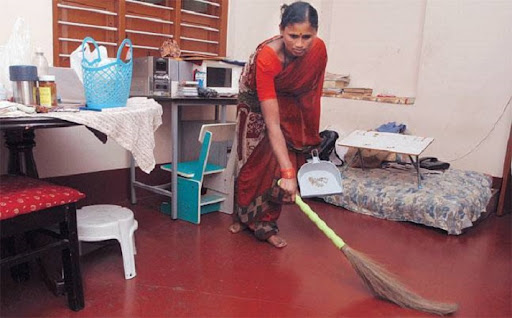By Divya Ravindranath
Every day millions of women in India enter their employers’ homes and perform duties such as cooking, cleaning and child minding.
Many work in multiple households. They work long hours doing menial tasks. They are poorly paid and — worse — despite being salaried employees, they have little or no protections from exploitation.
Estimates of the number of women working as domestics in India vary from three to 20 million. This reflects the challenges in accurately quantifying a workforce which remains invisible despite its ubiquitous presence in urban centres.
Designing, delivering and enforcing social protection for domestic workers is challenging for two reasons.
Without a written contract, individual households hesitate to acknowledge their role and responsibility as ‘employers’ as private homes of employers are not recognised as ‘places of work’.
While the implications of this for workers have been studied widely, an ILO-IIHS study set out to explore employers’ perspectives on social protection and their willingness to contribute to social protection measures for domestic workers.
Social protection, which includes insurance, maternity entitlements and cash transfers is crucial for those in informal work.
It helps these workers, who are often mothers themselves with a family to feed, cope with illness, accidents, maternity leave and old-age, unemployment or disasters.
In the 2030 Agenda for Sustainable Development, social protection is fundamental to achieve several SDG goals; SDG1 specifically calls on all countries to provide social security to all to end poverty in all its forms everywhere.
The COVID-19 pandemic exposed the gaps in social protection coverage, with domestic workers being among the worst-hit without any form of workplace benefits like health insurance or medical leave.
ILO-IIHS conducted a two-phased study in Bangalore and Chennai. In the first phase, we focused on questions of recruitment, income security, and employment and social security. We surveyed 3,067 employer households that engaged paid domestic workers in Bengaluru (1876 households) and Chennai (1191 households).
When it came to the responsibilities of the employers when a domestic worker falls ill or is pregnant, the dominant response in Bengaluru (40 percent) and Chennai (37 percent) was that employers should support expenses of treatment.
Of the 28 percent of households across both cities that noted that employers should give sick leave, about 59 percent and 44 percent in Bangalore and Chennai respectively noted that employers must provide paid sick leave.
However, we found considerable variation on whether employers should support expenses of treatment in full or in part.
When asked about maternity entitlements, only 36 percent of households in Bangalore and 16 percent in Chennai reported support for maternity leave with either full or partial salary payment.
Employers supported letting a worker go with a lump sum payment if they got pregnant (31 percent in Bangalore and 43 percent in Chennai), leave without salary (20 percent in Bangalore and 24 percent in Chennai) and the sack without offering any money (9 percent in Bangalore and 12 percent in Chennai).
In the second phase of the study, using the same sampling strategy as the first phase, we conducted qualitative interviews with a separate set of 403 households from 16 different neighbourhoods across Bengaluru and Chennai to understand existing practices in providing social protection for domestic workers.
Most employers reported already supporting their workers with financial aid and credit for children’s education, covering the cost of treatment during illness and other emergencies.
However, while employers supported the idea of maternity leave, they did not necessarily implement it. Instead, they reflected on the challenges it posed in making arrangements with their workers. They asked their workers to find a replacement and could not afford regular payment to the former worker if she availed maternity leave.
When asked if they would be willing to contribute to a formal social protection programme, we found three broad sets of responses:
Employers that were willing to contribute
They were open to contributing to workers’ medical insurance or obtaining group insurance (with multiple employers) for their employees.
Some employers preferred to deduct a percentage from workers’ salaries for future medical expenses or retirement. Others were willing to pay an additional amount ranging from 5 to 20 percent.
Employers that were hesitant to contribute
They expressed lack of knowledge and didn’t want to take up procedural responsibility anticipating complicated documentation and paperwork. Many were also sceptical about the effectiveness and sustainability of formal social protection schemes, fearing that the system might lack accountability or eventually die out.
Some suggested that instead of setting up provident funds and insurance mechanisms, safeguarding workers’ actual salaries might be more effective.
Employers that were unwilling to contribute
They considered the additional cost of social protection as being a financial burden that they could not afford as they were already responsible for salaries.
They suggested government medical insurance or financial aid to domestic workers to ease the financial burden on both employers and workers.
The study shows that a vast range of practices exist in employer homes. While several employers provided direct financial or in-kind ‘support’ to their workers it was often meted out as a form of benevolence and not as an entitlement.
Any form of social protection for domestic workers can respond to the following concerns.
First, what type of social protection is needed?
Our data shows that while employers are willing to provide support for illnesses and other household contingencies, maternity entitlements were not seen as a non-negotiable right of domestic workers though recognised by law.
Social protection could be responsive to the risks and vulnerabilities in the life cycle of an individual, and its provisioning requires tapping into various modes of delivery.
This takes us to who is responsible for social protection for domestic workers.
Employers are critical as they are the first point of contact for workers. Addressing the challenges employers face in direct provision of social protection requires a coordinated effort involving employers, workers and policymakers to ensure that domestic workers receive the protection and support they need.
The possibility of Resident Welfare Association-led initiatives could be further explored as a potential avenue for collectively delivering social protection.
However, this also means the need for an arrangement between welfare boards or other arms of the state, unions and workers, without which workers will have no recourse to redressal in case employers fail to deliver social protection.
The National Policy on Domestic Workers outlines a list of schemes that domestic workers can avail as part of the unorganised workforce.
This includes schemes such as health insurance, pension, subsidised medical facilities, and educational support for children.
However, this does not necessarily acknowledge the need for workplace benefits that are linked to employment security to prevent arbitrary termination from work.
The systemic neglect of this workforce is apparent from the fact that only a few states have included domestic workers in the schedule of the Minimum Wages Act.
In this sector wages remain abysmally low and strongly controlled by employer networks at the neighbourhood level as well as determined by the axis of workers’ gender (a feminised workforce undertaking gendered duties) and caste (low status work being fulfilled by marginalised communities).
Under such circumstances, whether from employers, the government or a combination of both, social protection is an absolute must for improving labour market outcomes.
The project was funded by the International Labour Organization (ILO).
Divya Ravindranath is a senior researcher at the Indian Institute for Human Settlements, Bengaluru. Her research interests include gender, informal work, social protection and urban health. Her current research project explores care infrastructure models for women in informal work. She holds a Masters and PhD degree in Social Work from Tata Institute for Social Sciences and Washington University in St Louis respectively. She would like to thank Antara Rai Chowdhury, Rashee Mehra and Dr. Gautam Bhan, her co-authors on the ILO- IIHS report.
Originally published under Creative Commons by 360info™.















